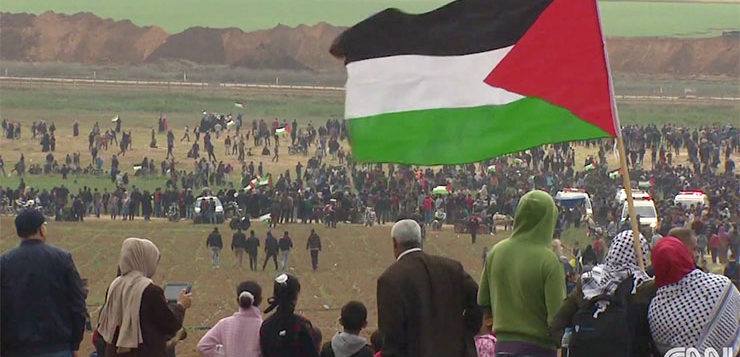We need to hear less from liberal Zionists about how pessimistic they are, and more about the urgency of justice for Palestine, says Nick Riemer.
Today is Nakba (‘catastrophe’) Day, when Palestinians commemorate the cataclysm of their expulsion from their homes in 1948. The most important voices to hear today are theirs: before they read Western commentators, anyone who cares about the tragedy of the Middle East should read Palestinian ones. There could be few better places to start than this powerful meditation by Randa Abdel-Fattah on loss, rage and hope.
But it is also important for those of us not directly affected by the ongoing ethnic cleansing of Palestine to show that we will not be silent: attending the demonstrations taking place around the country (in Sydney and Brisbane tonight, in Melbourne and Canberra on the weekend) are one obvious way to do so.
Protests are necessary, but they can seem a weak gesture in the face of the carnage on the Gaza boundary. Since the first Great Return March a month and a half ago, around ninety people have been killed by IDF snipers. The victims include at least two journalists and five children. As of midnight Sydney time on Monday, no less than 40 protesters had been killed, and over 900 injured in Gaza on that day alone.
As well as these assassinations, thousands of overwhelmingly peaceful Palestinian protesters have been deliberately shot, often causing devastating injuries, by members of the ‘most moral army in the world’. In at least 17 cases, amputations have been necessary. With mass crossings of the Gaza fence expected this week, the death toll can only mount tragically higher.
Israel’s actions have been documented and denounced by organisations like Medicins Sans Frontiere and Human Rights Watch. Yet, true to form, Western leaders, Australia’s included, have stayed eloquently silent. That silence expresses better than words the moral bankruptcy over Israel that has long been normalised within the Western ruling class. The US lobby group Jewish Voice for Peace recently took out newspaper advertisements noting that as of May 10, only 21 out of 535 members of Congress had spoken out against Israeli brutality during the Great March of Return protests.
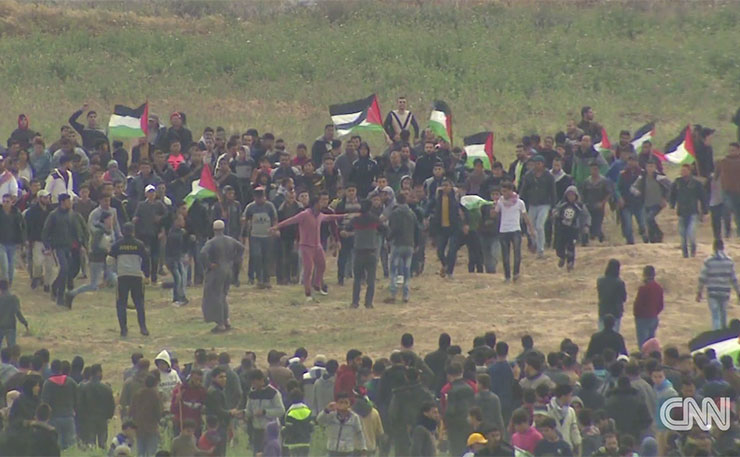
Fresh from our newly signed defence cooperation agreement with Israel, official Australian reaction to Israel’s Gaza slaughter has been precisely nil. It’s not, apparently, that Australian authorities are unmoved by loss of life: it just depends whose life it is.
On April 26, after four Fridays of protests, with 40 Palestinians already killed and 5511 wounded, Chris Cannan, the Australian ambassador to Israel, finally broke his silence – to tweet his sympathy after the drowning of 10 Israeli high-school students on a school excursion.
The ambassador stated he was ‘Deeply saddened to hear of the tragic loss of so many young lives today’ and that his thoughts were ‘with the students’ families and loved ones, and the people of Israel, at this terrible time.’ Neither he nor any other Australian Government official has had any ‘thoughts’ or sadness to express about the loss of young Palestinian lives, before or since.
Australia, Israel’s best friend
Cannan’s attitude is nothing new. On his visit to Australia in 2017, Netanyahu said that ‘there is no better friend [than Australia]for the state of Israel’. He wasn’t greatly exaggerating. The UN committee that drafted the 1947 Partition resolution creating Israel was chaired by an Australian, HV Evatt, as local politicians often remind us. A glance at Australia’s recent UN voting record speaks volumes about Australia’s position on the “extreme fringe” of world opinion on Israel.
In a 2012 vote making Palestine a UN non-member state, we abstained. In 2013, when a record 162 countries called for a stop to “all Israeli settlement activities in all of the occupied territories” and condemned any attempts to desecrate the Al-Aqsa Mosque, we abstained. We even voted against a UN resolution declaring the following year, 2014, the International Year of Solidarity with the Palestinian People. Faced with a proposal in the UN Security Council demanding Israel end the occupation of Palestinian territories within two years, we abstained.
At the same time, the Abbott government took the extraordinary step of ruling out using the term ‘occupied’ when describing Israeli settlements in East Jerusalem. In 2016, Australia indicated it didn’t support the UN Security Council resolution condemning the construction and expansion of settlements. Last year, when the UN passed a resolution in December condemning the projected move of the US embassy to Jerusalem, we abstained.
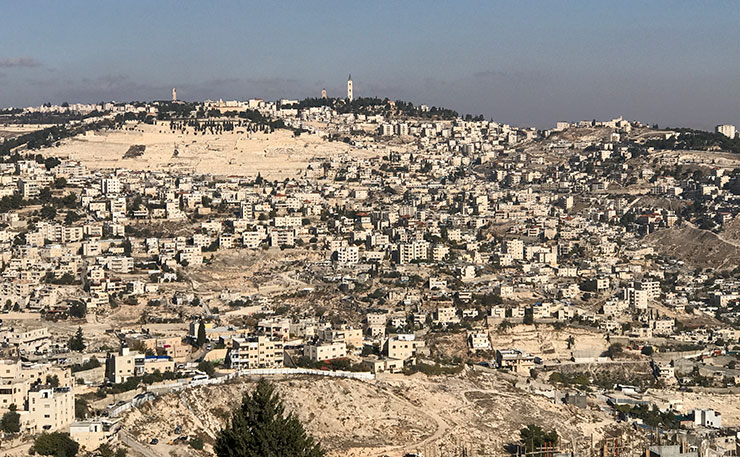
As my colleague Ben Saul, Professor of International Law at the University of Sydney has put it, “The Australian government has become an apologist for Israeli war crimes and a wrecker of sacred international humanitarian law principles.”
We can contrast Australia’s official attitude during the current Gaza protests with that of France, not well known for its fondness for Palestinians. In the wake of Israel’s Gaza outrages, the French foreign ministry told L’Humanité newspaper that ‘France condemns indiscriminate shooting by the Israeli army, calls for the lifting of the Gaza siege, and for restraint and the proportionate use of force.’ That statement falls scandalously short of what is needed, but it goes far beyond anything any Australian government official has found it in themselves to say.
Too complex to solve?
When criticized on our record, Australian politicians often fall back on the stock claim that the Middle East is ‘complicated’. It’s the same defence that Zionists themselves are quick to jump to when they want to justify Israel’s crimes. The Palestine question is just so complex, we’re told. The message is that unless you’re an expert, you simply don’t have the right to venture an opinion on the subject.
This reactionary mystification serves one purpose only: to quarantine Israel from the condemnation of public opinion. The idea that Israel-Palestine is somehow different from other questions of world politics – that people can have a view on what’s happening in Tibet, the US, or Myanmar, but that Israel is just too hard – is one of the strategies that Zionists use to delegitimize criticism.
We need to reject the notion that the Israel-Palestine question is characterized by a superhuman degree of complexity. Many well informed, expert analysts on the left — people like Gideon Levy or Randa Abdel-Fattah — tell us the exact opposite: that, actually, the situation is simple, that Palestinians themselves have been testifying for years about what’s going on and that, as a result, you don’t need to have studied or lived in the Middle East to be able to take a side.
Certainly, the fundamental consideration about Israel-Palestine politics couldn’t be simpler: the fact that in Israel, there is not one single place built that did not have a former Arab population. That’s not me saying it, or Gideon Levy or Randa Abdel-Fattah. It’s not even a Palestine supporter: it’s a quotation from Moshe Dayan, the Israeli general and defence and foreign minister in a lecture in Israel in 1969.
The Nakba is the root of the tragedy of the Palestinian people. When this obvious point is made, Zionists retort that it sounds a lot like calls for Israel’s dissolution, and go on to make an instant comparison to Hamas: apparently, anyone who wants Israeli apartheid replaced by a democratic state where Palestinians and Jews are equal can only be calling, like Hamas, for Israel’s ‘destruction’.
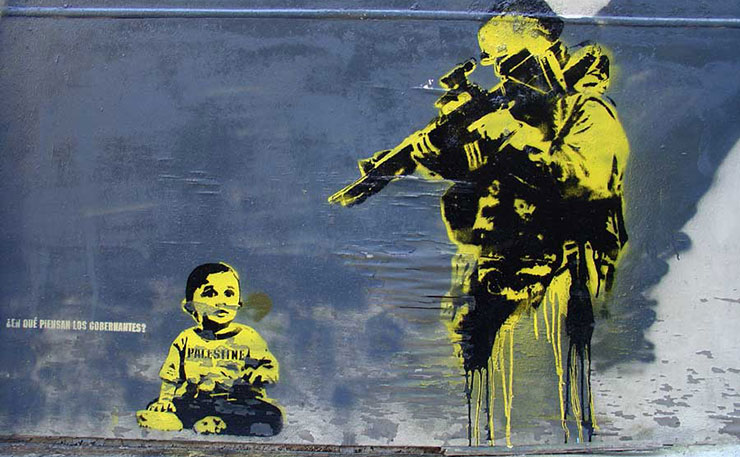
But Israel’s policies on Gaza and settlements, and the major legislative step just taken by the Knesset towards the legal establishment of Jewish-only communities in Israel, show us that it’s Israelis who want to replace Palestinians, not the other way around.
The new Hamas charter of 2017 states that ‘without compromising its rejection of the Zionist entity and without relinquishing any Palestinian rights, Hamas considers the establishment of a fully sovereign and independent Palestinian state, with Jerusalem as its capital along the lines of the 4th of June 1967, with the return of the refugees and the displaced to their homes from which they were expelled, to be a formula of national consensus’.
It’s true that the charter is an ambiguous document, but its de facto acceptance of Israel and the 1967 borders is a major concession. If that’s what Hamas is capable of while Gaza is being throttled, what could it do with an Israel that wasn’t intent on settlements, abided by international law, and let Palestinians work, travel and live in their homes?
Liberal Zionist pessimism
Complexity isn’t the only ideological mechanism which Zionists use in order to secure inaction over Palestine in the West. Another is pessimism. Liberal Zionists frequently tell us how pessimistic they are about peace. Australian Zionists Philip Mendes and Nick Dyrenfurth do so in their 2015 anti-BDS tract, Boycotting Israel is Wrong: they are, they say, ‘highly pessimistic about the chances of a peace deal being struck in the near future’. Mark Baker said something very similar just a few weeks ago at a Sydney Writers’ Festival panel.
We need to hear less from liberal Zionists about how depressed and pessimistic they are, and more about the urgency of justice for Palestine. No-one should care about Zionists’ pessimism: the main effect of their articulating it is to sap the audience of any commitment to acting for change.
Pessimism and depression are infectious, and lead inexorably in one direction: back to the status quo. On the surface, liberal Zionists may lament the fact that progress in Israel seems unlikely, but the effect is to deliver exactly the same message as Netanyahu: nothing is going to change, so Palestinian resistance is futile.
Writers and academics who want a just peace in the Middle East would do well to take some advice from an influential French Jewish intellectual of the first half of the 20th century, Julien Benda. In words that could have been addressed to the pessimistic liberal Zionists of our own age, Benda wrote that “when we see moralists, educators, professional providers of spiritual guidance, assert at the spectacle of human barbarism that ‘that’s what humans are like’, that ‘that’s how you have to take them’, that ‘you will never change them, we are tempted to ask them what is their reason for existing’.”
Benda’s question is a good one. If Zionist intellectuals can’t do better than proclaim their pessimism, it’s genuinely puzzling as ‘thought leaders’ what they see their role to be. If peace and progress are out of reach, why pour such effort into discussing them? Benda’s answer is categorical: by affirming the impossibility of progress, intellectuals “create that eternity of barbarism necessary to the maintenance of the institutions which are dear to them”.
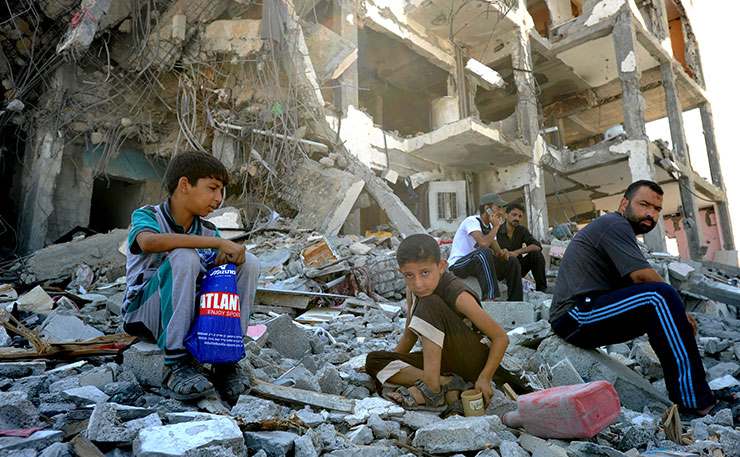
Israel imprisons Gazans in a hell of undrinkable water, permanent power cuts, one of the world’s highest unemployment rates and periodic murderous assaults. It forces Palestinians on the West Bank to go about their lives in a rat-run of rubble, checkpoints and barbed wire. For as long as that assault on human decency continues, there will be a need for Zionist intellectuals to rationalize those crimes to a Western elite that has every reason to want to avoid criticism of Israel.
BDS: a global intifada for justice and peace
No-one thinks that peace can be forged overnight. But rather than proclaim their pessimism, anyone who really cares about peace in Palestine-Israel should embrace the currently most promising tactic of the Palestine solidarity movement: the boycott, divestment and sanctions campaign (BDS).
In the last few months, the pace of BDS actions has accelerated remarkably, especially on the cultural front. Figures as diverse as the NZ singer Lorde, Paul McCartney, Jean-Luc Godard and Natalie Portman have all refused ties with Israel. Not all of these personalities have been prepared to admit that they are implementing the boycott, but the reality is that, whatever they call it, that is exactly what they have been doing.
Disappointingly, the Australian singer Jessica Mauboy has recently made the opposite decision. The victory of Netta Barzilai in this year’s Eurovision Song contest, in which Mauboy took part, means that next year’s final will take place in Israel. This is a significant opportunity for the boycott campaign. Already, the Lord Mayor of Dublin has called for Ireland to boycott the contest.
In Australia, BDS efforts have recently been scaled up. Following a large BDS conference at Sydney University last year, the first Australian national BDS committee has been constituted, and is busy working on campaigns. Boycott activities are not new in this country, and have been far from unsuccessful. Marrickville council voted in favour of BDS in 2010 (the decision was subsequently overturned under intense pressure). At Sydney University, Jake Lynch won a landmark case establishing the legality of the academic boycott in 2014.
Last year, BDS activists successfully campaigned for the Royal Flying Doctor service to pull out of a multi-million dollar contract with the Israeli weapons and ‘security’ firm Elbit, who were going to supply them with a flight simulator. This year, academics at Sydney University made national and international news when over 40 of us pledged to cut ties with Israeli academic institutions. The same pledge has gathered over 20 signatures at the University of Wollongong, and efforts are underway on other campuses.
With the new national committee, BDS in Australia now has a national strategy and coordination, and there’s every reason to hope that boycott activity here will be significantly boosted.
Australia is far from the centre of the Israel-Palestine issue, but what happens here still matters. John Lyons reminds us in his recent book, Balcony over Jerusalem, that in the 2009 Israeli war on Gaza, Cast Lead, no less than three prominent spokespeople for the Israeli side were all Australians: Netanyahu’s spokesman, Mark Regev, and IDF spokesmen Benji Rutland and Guy Spiegelman. Regev is now Israeli ambassador to the UK.
The fortunes of Zionism in Australia are noticed in the world beyond it. Since the pressures on politicians to remain bankrupt are strong and most politicians’ willingness to resist them absent, civil society must act. If there is a preferable tactic to BDS, no-one has yet demonstrated it. Against the ‘passivism’ of Zionist propagandists, BDS is a global intifada for justice and peace through which everyone can actively contribute to the struggle for Palestinian rights.
Donate To New Matilda
New Matilda is a small, independent media outlet. We survive through reader contributions, and never losing a lawsuit. If you got something from this article, giving something back helps us to continue speaking truth to power. Every little bit counts.

